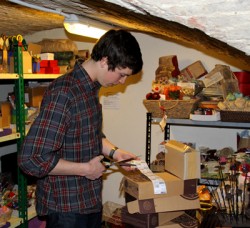Student’s Voice: A Crash Course in Fair Trade
In the final installment of our special, three-part mini blog series, we take a look into the daily routine of a Fair Trade Intern. Joe Yankelowitz, of Washington and Lee University, is studying abroad in Italy and currently enrolled in Umbra’s INIT 350: Academic Internship and Seminar: Fair Trade course.
———–
“I always show up hungry, and I regret it,” Breanne says to me as we restock the shelves of food in the Monimbo Fair Trade store. Filled with a variety of food items, all produced under the ethical guidelines of Fair Trade principles, Monimbo tests our snacking discipline for the three hours a week we work there as interns. Most trying is a wall of chocolate, borne straight from the halls of Wonka. Delicious temptation… near the spice rack.
 Besides tending to the food shelves and staring longingly at the dozens of chocolate varieties, Breanne and I have a number of responsibilities at Monimbo. We tidy the store, organize new inventory, run errands for the shop, and seek to corral the controlled chaos of the back room. I guess I would characterize our working hours as a cross between retail and the Wild West, but in Italian.
Besides tending to the food shelves and staring longingly at the dozens of chocolate varieties, Breanne and I have a number of responsibilities at Monimbo. We tidy the store, organize new inventory, run errands for the shop, and seek to corral the controlled chaos of the back room. I guess I would characterize our working hours as a cross between retail and the Wild West, but in Italian.
Italian, the language, adds a fun dimension to the Monimbo internship. Millena, the commander-in-chief, speaks to us primarily in Italian and encourages us to practice our linguistic skills. We do this through interacting with the customers, whom we angle for like fishermen. Whenever the opportunity presents itself, I eagerly offer to help the store’s clients. Currently, I’ve hooked three chances, and they’ve all gotten away. Once, my Italian failed me, another time it was my underdeveloped knowledge of the store, and the third time I choked. Millena is patient with me, though, and knows that I’m no expert in Italian, or retail. I’m awful at retail.
At its heart, the internship is a crash course in Fair Trade. Each day in the store we see firsthand the results of the social, economic, and ethical principles of Fair Trade and its geographic reach. This experience supplements our in-class readings and gives life to our discussions on issues surrounding Fair Trade. It immerses us in the unique and holistic world of Fair Trade economics. It also reminds us not to skip lunch.